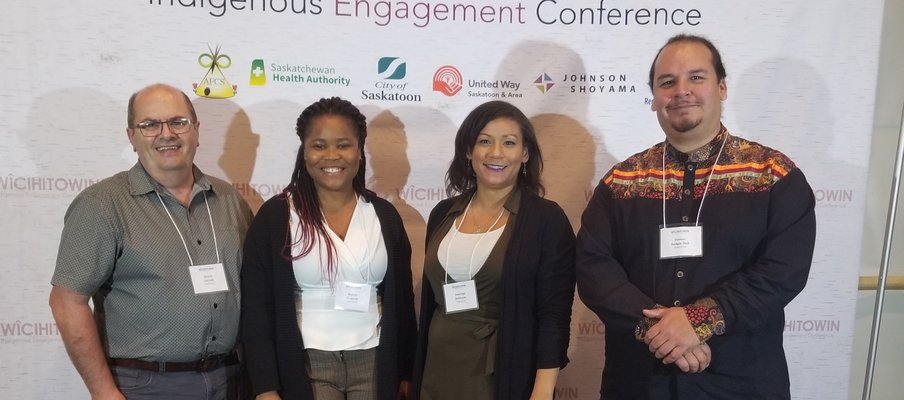Deepening understanding of Truth and Reconciliation: Guiding change through relationships and shared learning

The release of the Truth and Reconciliation Commission’s (TRC) Call to Action in 2015 marked a defining moment for SaskCulture’s commitment to listen deeply, confront difficult truths, and take meaningful steps toward change.
Through ongoing staff training, community engagement, and support for Indigenous-led initiatives, SaskCulture has been on a learning journey rooted in building respectful relationships and turning its commitment into action.
Damon Badger Heit, supervisor, partnership and inclusion, SaskCulture, notes that SaskCulture had already begun some work towards supporting both Indigenous-led cultural initiatives and cross-cultural awareness activities prior to the release of the TRC report, but the framework offered by the Calls to Action report made it clear — there was still so much more to be done.
“The first thing we learnt as an organization is that it is everyone who has responsibilities to take meaningful steps forward, both as individuals on a personal journey of Reconciliation, as well as contributing to advancing the work of SaskCulture as a whole,” says Badger Heit. “Truth and Reconciliation touches on all facets of society and at all levels of an organization. It is not a First Nations person’s or individual staff role to lift on behalf of the entire organization. It’s everyone’s responsibility.”
One of the first key changes SaskCulture made was to support ongoing learning opportunities for both staff and Board members. Attending conferences such as Wîcihitowin, participating in First Nations and Métis awareness training, engaging with Elders and residential school Survivors, and watching films such as Nîpawistamâsowin: We Will Stand Up by Tasha Hubbard together as a staff and holding space for difficult dialogues all contributed to a deeper understanding of the histories and lived realities of Indigenous peoples, and the ongoing impact of colonial systems on their inclusion and engagement.
Taking part in truth-telling opportunities helped create the space for honest conversations and enabled the Board and staff, who will be involved in this work, to better understand the importance of building relationships and advancing Reconciliation within the cultural sector and beyond.
“SaskCulture created space for us to have difficult and emotional conversations with one another. It wasn’t easy, but it became a meaningful part of our work,” says Lorelie DeRoose, granting and evaluation coordinator, SaskCulture, who joined the organization just weeks before the release of the TRC report in 2015.
She continues, “Having Elders such as Eugene Arcand guide us through those moments brought a depth of understanding we couldn’t have reached on our own.”
Busayo Osobade, communications manager, SaskCulture, shares a similar experience. “My first experience with the KAIROS Blanket Exercise was at SaskCulture, and it was facilitated by Elder Lillian Piapot,” she recalls. “Physically stepping through the history and lived realities of Indigenous peoples made it real. It brought the impact of colonization to life in a way that reading never could. That, along with other learning opportunities, helped us see why this understanding must be at the heart of the work we do.”
Over time, several key moments have paved the way for meaningful change. From 2016 to 2018, SaskCulture coordinated a Reconciliation and Respect: Canada 150 and Beyond project — an initiative aimed at creating long-term partnerships with organizations such as the Buffalo People Arts Institute, Gabriel Dumont Institute, Saskatchewan Indigenous Cultural Centre, Saskatchewan Aboriginal Writers’ Circle Inc. and SK Arts, which led to reimagining new modes of sustained partnerships and ultimately gradual change to funding processes and programs that includes Indigenous leadership working directly with SaskCulture.
In 2018, SaskCulture amended its Principles and Values within its Constitution to include a formal commitment to Truth and Reconciliation. This shift embedded Reconciliation into the very foundation of the organization, not as an add-on but as guiding principles to its work. And more recently, the Funding Program Renewal Project reflects a deep commitment to Inclusivity, Diversity, Equity and Accessibility, including Truth and Reconciliation, ensuring that SaskCulture’s funding system better reflects the diverse histories, voices, and needs of Indigenous peoples and communities across Saskatchewan.
“Including Truth and Reconciliation in our Constitution was a moment of deep reflection for us. It signaled a shift in how we see our role,” says Dean Kush, chief executive officer, SaskCulture. “It challenged us to look inward, to acknowledge where change was needed, and to move forward with greater care and responsibility.”
SaskCulture continues to work closely with Indigenous partners and community leaders to help guide its path. The generosity of Indigenous Elders, leaders, volunteers and partners continues to be instrumental on this journey, which still has a long road to travel.
“These changes would not have been possible without the many meaningful relationships we’ve built with First Nations and Métis peoples and organizations, whose guidance, trust, and honesty have helped shape our understanding and direction,” says Badger Heit.
Kush agrees, adding that SaskCulture recognizes Reconciliation as an ongoing journey — one rooted in continuous listening — and is committed to walking that path with open ears, minds, and hearts.

